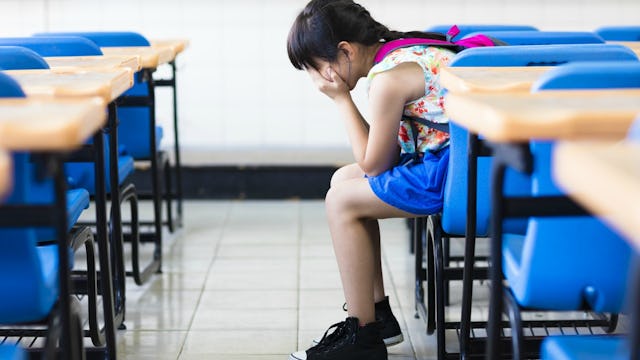Why I Support Taking Away Recess For Poor Behavior

I support taking away my children’s favorite things as a consequence for bad behavior. At home, that may be Fortnite or access to their phone or time with friends. And at school, that may be recess—which makes perfect sense to me so I said so via Twitter and Facebook.
I knew this was an unpopular opinion but I must admit, it was eye-opening to see how much parents—and educators—fundamentally disagree on this very basic issue of lost privileges and consequences for behavior.
We all agree that recess is good for kids. No one that I know of disputes the American Academy of Pediatrics (AAP) or the Centers for Disease Control when they extol the importance of physical activity, unstructured play, and “getting the wiggles out.” When researchers say that recess provides a much needed “reset button” for kids’ brains, most of us nod in agreement because it makes perfect sense and we’ve seen it work for our own kids (and likely even for ourselves).
But where some parents and educators push back on the AAP is their claim that recess “should not be withheld for punitive or academic reasons.” That recommendation is very broad and essentially espouses the idea that no child should EVER have recess withheld no matter what the specifics of the situation are. As a parent, I just can’t get on board with that.
As Evie Blad wrote in Education Week, teachers who resist losing this discretion over discipline in their classrooms argue that withholding cherished playtime clearly communicates to children that their misbehavior is unacceptable. Bingo!
For many students—including all of my own children—recess is (or was) their absolute favorite part of the day and that makes it a powerful lever for changing student behavior. I have always supported teachers turning to recess as a lever with my kids because in their world, losing something they love is a logical consequence for bad behavior and wrong choices.
I was struck by educators and parents responding in vehement disagreement and making the claim that taking away recess is not a logical consequence unless the bad behavior occurs at recess. Says who? If the consequence is logical in the mind of the child, isn’t that what matters?
Some experts disagree. They think we need to get to the root of the bad behavior and understand its underlying cause. And sure, sometimes that is absolutely needed but often, there is no underlying cause and the kid is just talking out of turn or being the class clown because he or she feels like it. Every infraction by every child does not need to be psychoanalyzed and we do students—and parents—a disservice when we pretend that it does.
While lots of parents agree with the opinion that teachers need the recess lever as just one tool in their toolbox, almost as many seem adamantly opposed. They solidly believe that recess should not be taken away. Ever. Some rightly wondered about the children who can’t control their behavior because of a disability but in that situation, revocation of recess would be the wrong course of action. They raised the concern that too many teachers would default immediately to this consequence and students could end up missing recess nearly every day. I share that concern but think it’s clear that if a child is losing recess on a regular basis, then the strategy of taking it away is not working. If it’s not an effective lever, it shouldn’t be used.
Other concerns raised in my conversations on Twitter and Facebook included special education, racism, and state laws about minimum recess requirements— all are important and need to be part of this larger conversation about consequences for younger students. We’d be foolish and irresponsible to ignore what has happened to young Black boys and girls when it comes to discipline in schools. But the idea that we would, across the board, take another tool out of the teachers’ toolbox that can be highly effective for some students also seems misguided.
If we continue to support blanket bans on strategies for discipline that are effective for some students, we will reach a point—and in some places maybe we already have—where parents and experts reject any and all punitive consequences and teachers and schools will have little to no autonomy in managing and responding to student behavior.
And then what happens?
This article was originally published on